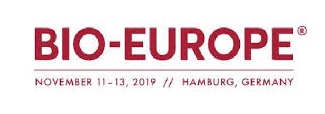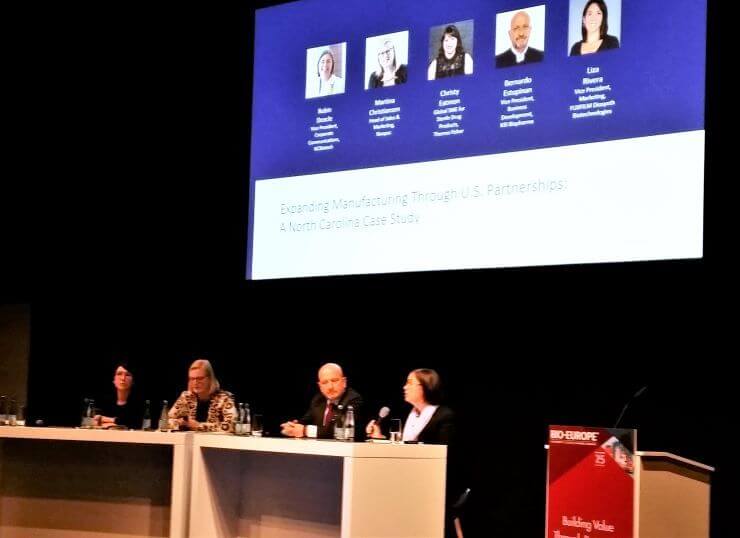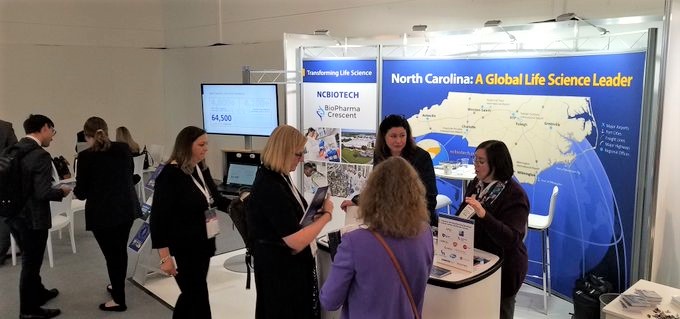
North Carolina’s Solutions for Euro Life Science Companies’ U.S. Manufacturing Needs
 European life science companies encounter challenges when setting up shop in the United States. Some can be straight forward, such as dealing with different voltage on machines. Others can be more significant, such as a systematic bias toward bachelor’s degrees over technical education. The North Carolina Biotechnology Center convened a panel of companies with operations in North Carolina at BIO-Europe 2019 to explore these challenges and possible solutions.
European life science companies encounter challenges when setting up shop in the United States. Some can be straight forward, such as dealing with different voltage on machines. Others can be more significant, such as a systematic bias toward bachelor’s degrees over technical education. The North Carolina Biotechnology Center convened a panel of companies with operations in North Carolina at BIO-Europe 2019 to explore these challenges and possible solutions.
“As a company with global reach, we at FUJIFILM Diosynth Biotechnologies think and act globally,” said Liza Rivera, the company’s vice president of marketing. “We are harmonizing our procedures at all of our sites. For example, while the power and metric systems may be different across sites, this global mindset helps us in our readiness to support customers within our network.”
Rivera and two other panelists, Martina Christiansen from Hoffmann Neopac Group and Bernardo Estupiñán from KBI Biopharma, shared their insights on everything from taxes to talent. North Carolina’s life science ecosystem offers several advantages, Rivera said.
Robust Talent Pipeline
As companies expand life science manufacturing in the U.S., a chief concern is having qualified workers to run their operations. With North Carolina’s workforce in life science production and manufacturing at 26,500+ employees, the panelists agreed that North Carolina has a strong talent pool. However, it is getting more competitive.
“Leading companies, such as Pfizer, bluebird bio and AveXis, are vying for North Carolina’s highly skilled workers,” said Rivera. “This has forced FUJIFILM to keep on our toes and be creative. Consequently, we initiated an internship program to attract the best students even before they enter the workforce.”
In addition to its top-tier universities pumping out new engineers and scientists, North Carolina has unique training programs and public/private partnerships that fuel its workforce pipeline.

and Moderator Robin Deacle, vice president of
Corporate Communications at NCBiotech
One such gem is the Biomanufacturing Training and Education Center (BTEC) at NC State University, which provides training on GMP production of biologics for undergraduates, graduate students, and industry professionals.
In August, 2019, Novo Nordisk Foundation awarded a $27 million grant for a five-year project known as Accelerated Innovation in Manufacturing Biologics (AIM-Bio). NC State and Technical University of Denmark (DTU) will collaborate on developing eight new combined lecture and hands-on short courses for industry professionals, focusing on cell factory engineering, bioreactor design, and optimization of biopharma products. NC State University will receive $18 million for its activities, with $9 million earmarked for DTU.
BioNetwork, the life science training initiative of the North Carolina Community College System, connects students with biomanufacturing courses and degree programs across the state. BioNetwork also offers customized training solutions for life science companies based on current needs.
Better Serving Local Clients
Swiss company Hoffmann Neopac Group opened its first U.S.–based tube manufacturing facility in Wilson, North Carolina in May 2019. This new facility has helped Hoffmann Neopac Group serve customers faster and more cost effectively.
“North Carolina has two ports for importing materials,” said Martina Christiansen, Hoffmann Neopac Group’s head of sales and marketing. “The ports are one of the reasons why we selected North Carolina. But, the state also offered us a green field for building, with plenty of room to grow.”
Future Focused on Innovation and Flexibility
Flexibility in manufacturing was a key theme among the panelists, who cited trends toward small-batch manufacturing, the need for high quality batch turnovers, and more personalized treatments.
“When manufacturing in the U.S., regulatory requirements must be met,” said Bernardo, vice president of business development at KBI Biopharma. “However, you can’t let regulatory requirements stifle innovation. As a contract manufacturing organization, we must be nimble and meet clients’ project timelines. When a product receives FDA approval, we must be able to get the new product to patients as quickly as possible.”
Joining a Life Science Hub
“For the past 35 years, NCBiotech has served as a central resource to bring the life science community together to define problems and create solutions,” said Robin Deacle, NCBiotech’s vice president of corporate communications. “Workforce development and waste water treatment issues are two challenges currently being addressed.”
North Carolina offers cost advantages compared to other life science hubs. The state has the lowest U.S. corporate income tax rate in addition to low utility and operating costs. The cost of living in North Carolina is also far below what is available in California or Boston.
“In the past, people from Boston were not open to relocating to North Carolina,” remarked Rivera. “We see in our recruiting efforts that this has changed.”
For more information on North Carolina’s growth in pharma and biomanufacturing, read the highlights from the 2018 Teconomy report on the impact of biomanufacturing in North Carolina.
BIO-Europe was held from November 11-13, 2019, in Hamburg, Germany. Attracting more than 4,400 participants from 2,300 companies, the annual conference brings together the life science community through its programs, partner meetings, and exhibitions.

Photo by Johnston County Economic Development
For questions or more information, contact:
Mary Hecht-Kissell, MBA
Vice President, Corporate Communications
Corporate Communications
919-314-8383
| mary_hecht-kissell@ncbiotech.org
